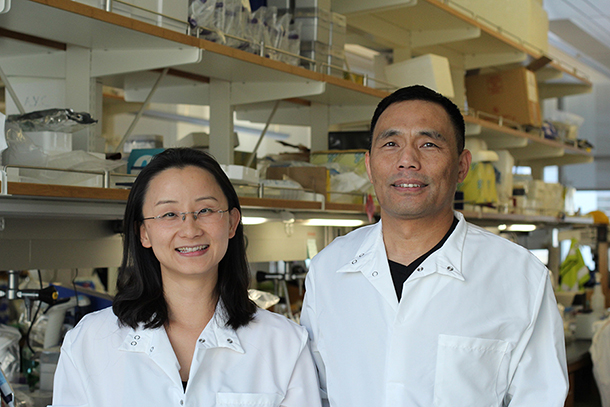Imagine an ever-renewing source of immune cells that can be engineered to attack cancer and infections. The winners of this year’s Eli and Edythe Broad Innovation Award at USC are already striving to turn this exciting concept into a reality.
The collaborative research project brings together Qi-Long Ying, MD, PhD, and Rong Lu, PhD, two faculty members in the Department of Stem Cell Biology and Regenerative Medicine at the Keck School of Medicine of USC. By combining their expertise, they hope to find better ways to cultivate the progenitor cells that eventually become two key types of immune cells: macrophages and granulocytes.
The Ying Lab has already made progress in maintaining and growing these granulocyte/macrophage progenitors (GMPs) in the laboratory, thanks to an unrestricted gift from Chinese businessman Yong Chen. Specifically, the Ying Lab identified two molecules that enable GMPs to produce more of themselves — an ability to self-renew that they don’t normally have.
Now, in collaboration with Rong Lu’s Lab, the Ying Lab will continue to explore ways to encourage GMPs to self-renew. They will test whether these GMPs can differentiate into fully functional macrophages — which form the body’s first line of defense by engulfing and digesting invading bacteria and viruses, as well as cancers. They will also genetically modify these GMPs to empower them to more aggressively attack cancer cells.
To support this project, the Eli and Edythe Broad Innovation Award provides $100,000 of research funding and $20,000 of additional services — such as molecular screening or genetic engineering — in core facilities at the Eli and Edythe Broad Center for Regenerative Medicine and Stem Cell Research at USC.
“Thanks to this award, my lab and Dr. Ying’s lab are able to collaborate, which accelerates our progress towards developing new stem cell-based treatments for patients,” Lu said.
Ying added: “We are grateful to the Eli and Edythe Broad Foundation for supporting this important research to develop cancer immunotherapies.”
— Cristy Lytal


